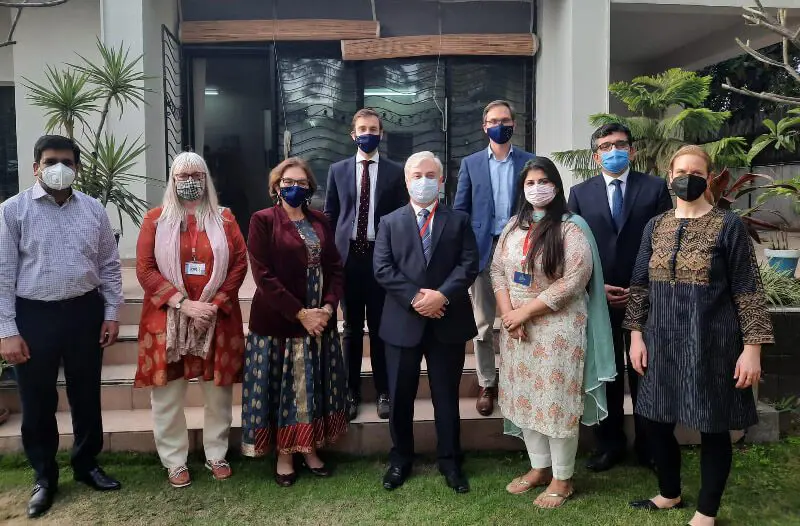Press releases
ISLAMABAD, 16 March 2021: The European Union will support Pakistan’s Civil Society by co-financing three projects, for a total amount of 7 237 500 EUR, to alleviate the socio-economic impact of the COVID-19 outbreak on communities and increase the voice of youth in society.
The announcement follows the signing of three contracts by H.E. Ms. Androulla Kaminara, Ambassador of the European Union to Pakistan and the representatives of the main implementing partners: Agha Khan Foundation, Norwegian Church Aid and Deutsche Welthungerhilfe. The three projects were selected through a call for proposals launched in April 2020 and focus on Punjab, Sindh and Gilgit Baltistan.
In Pakistan, the virus is posing a threat to people’s lives, straining communities, overwhelming health systems and endangering livelihoods. Young people in particular, who make up a majority of Pakistan’s population, have been severely affected by the pandemic in terms of unemployment, increased gender inequalities, social exclusion and a diminished voice in the decision-making processes.
The projects aim to build Civil Society Organizations capacity to mobilise and engage youth, enhance involvement in decision-making, and improve access to economic opportunities for marginalized groups.
At the signing ceremony, Androulla Kaminara, Ambassador of the European Union to Pakistan, said, “As the world continues to battle the COVID pandemic, it is important to focus our efforts on supporting the most vulnerable. Civil society organisations are important partners for the EU wherever we work, and have been crucial in Pakistan’s efforts to respond to the current crisis. The initiative leading to today’s successful proposals was one of the first concrete actions taken by the EU last year to alleviate the effects of the pandemic in the short and long term in Pakistan. The pandemic has had a disproportionate impact on young people – which is reflected in the areas prioritised by these projects including youth engagement and economic empowerment.”
Dr Matt Reed, CEO of Agha Kahn Foundation (UK), said: “During this pandemic, in Pakistan and around the world, civil society has been vital: raising awareness, teaching people how to help their families and neighbours safely, protecting their communities from COVID-19. The Aga Khan Foundation is delighted to partner with the European Union in strengthening community organisations and civil society at this crucial time.”
In her speech, Anne Masterson, Country Director of the Norwegian Church Aid emphasized that, “Through this project young people will have opportunities to improve and diversify their skills, obtain training and establish livelihoods. Youth, particularly young women, will become more effective change agents by strengthening their voice within their communities and in the wider society.”
Aisha Jamshed, Country Director of Deutsche Welthungerhilfe, stated that, “Through the project, CSOs will build the skills of young men and women, provide them with income opportunities and giving them a voice by advocating for improved service delivery with Local Authorities. Welthungerhilfe values the consistent contribution of the European Union to the organization over the past ten years, along with EUs contribution to the civil society development across Pakistan.”
In Pakistan, the EU is committed to a stable, democratic and pluralistic country that respects human rights and benefits from its full economic potential by supporting sustainable and inclusive development for all its citizens. The EU provides Pakistan with about €100 million annually in grants for development and cooperation. Among other issues, the EU supports Pakistan in its efforts to tackle poverty, increase education, promote good governance, human rights, rule of law and ensure sustainable management of natural resources. EU-funded projects cover all of Pakistan with a special focus on Sindh and Balochistan.
More information on the European Union’s cooperation with Pakistan can be found here:
https://eeas.europa.eu/delegations/pakistan/area/projects_en







